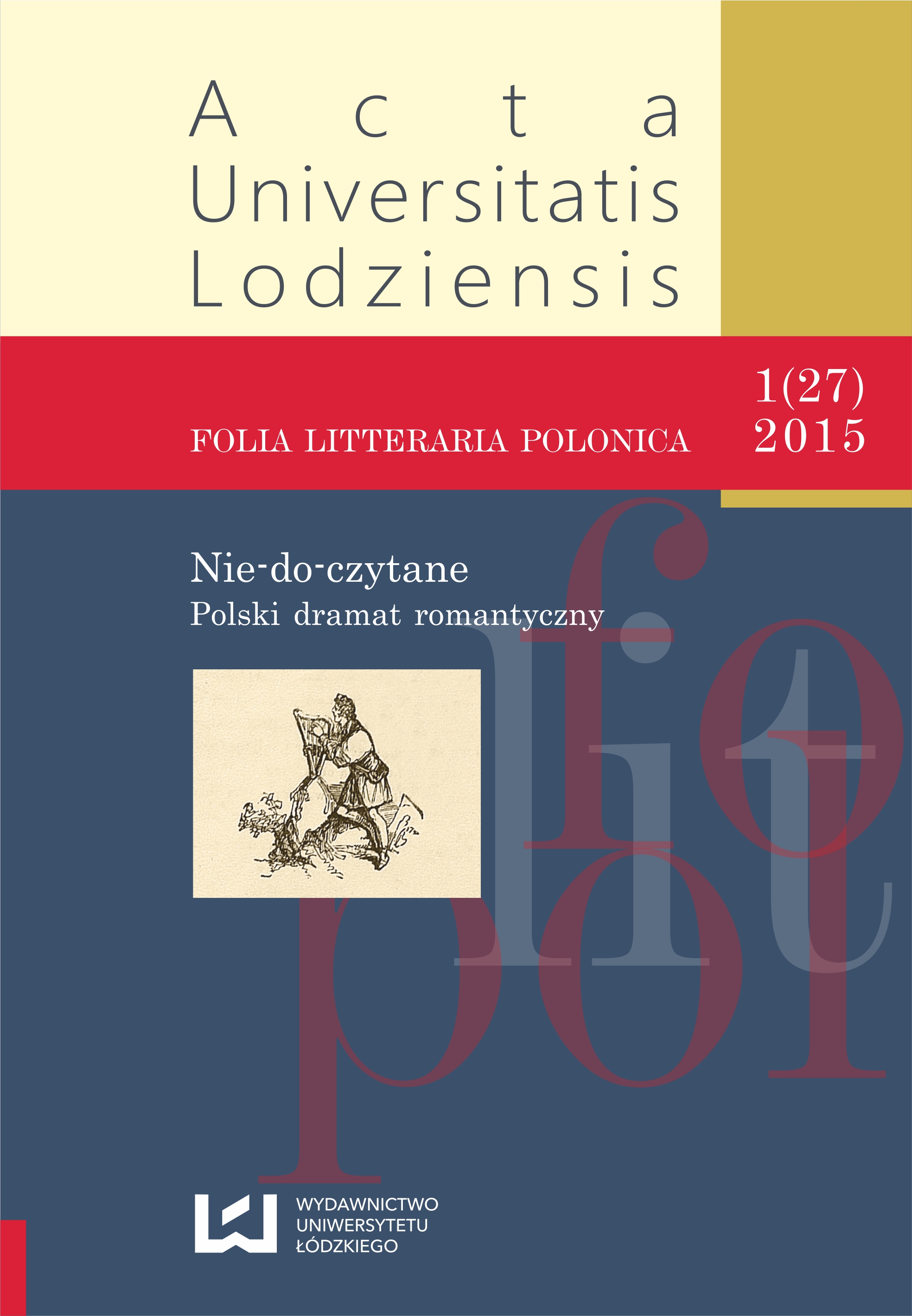„Tylem wytrwał, tyle wycierpiałem…” Werteriada Carla Ernsta Reitzensteina jako przedmiot odniesień w IV części Dziadów Adama Mickiewicza
DOI:
https://doi.org/10.18778/1505-9057.27.02Słowa kluczowe:
Wertheriad, song, elegy, unfortunate love, grave, mourning, bewailing, remembering, sentimentalismAbstrakt
The aim of the article is to complement the research on Dziady, Part IV by Adam Mickiewicz with a previously unexplored question of references to two stanzas from C.E. Reitzenstein’s Lotte bei Werthers Grabe, a youthful work of the poet, which the author of the drama wrongly attributed to Goethe. Considering that the author of this Wertheriad, which was very popular at the turn of the 18th century, is not very well known in the Polish culture, it is necessary to include a few aspects related to his biography. The analysis is concerned with the aesthetics, meaning and idealistic relations that connect Reitzenstein’s poem with Dziady, Part IV. The paper also contains a comparison of the reception of the German poet’s elegy in German-speaking countries and functionalising it in Mickiewicz’s drama.
Pobrania
Bibliografia
Andree M., Wenn Texte töten. Über Werther, Medienwirkung und Mediengewalt, München 2006.
Google Scholar
Borowy W., O poezji Mickiewicza, wyd. 2 uzup., przygotowali Z. Stefanowska i A. Paluchowski, Lublin 1999.
Google Scholar
Erläuterungen und Dokumente. Johann Wolfgang Goethe, „Die Leiden des jungen Werthers”, hrsg. von K. Rothmann, Stuttgart 1971.
Google Scholar
Goethe W., Cierpienia młodego Wertera, przeł. L. Staff, wstęp O. Dobijanka-Witczakowa, wyd. 2 zmien., Wrocław 1971, BN II 22.
Google Scholar
Janion M., Żmigrodzka M., IV część „Dziadów” i wczesnoromantyczny bohater egzystencji, „Pamiętnik Literacki” 1987, z. 1, s. 3–13.
Google Scholar
Kleiner J., Mickiewicz, t. 1, Dzieje Gustawa, wyd. 2 popr., Lublin 1995.
Google Scholar
Kuczera-Chachulska B., Przemiany form i postaw elegijnych w liryce polskiej XIX wieku, Warszawa 2002.
Google Scholar
Ławski J., Marie romantyków. Metafizyczne wizje kobiecości. Mickiewicz – Malczewski – Krasiński, Białystok 2003.
Google Scholar
Mickiewicz A., Dziady, [w:] Dzieła poetyckie, t. 3. Utwory dramatyczne, Warszawa 1982.
Google Scholar
Okopień-Sławińska A., Rola konwencji w procesie historycznoliterackim, [w:] Proces historyczny w literaturze i sztuce, pod red. M. Janion i A. Piorunowej, Warszawa 1967, s. 61–80.
Google Scholar
Piasecka M., Mistrzowie snu. Mickiewicz – Słowacki – Krasiński, Wrocław 1992.
Google Scholar
Przybylski R., Słowo i milczenie Bohatera Polaków. Studium o „Dziadach”, Warszawa 1993.
Google Scholar
Reitzenstein C.E., Lotte bei Werthers Grabe, [w:] Erläuterungen und Dokumente, Goethe, „Die Leiden des jungen Werthers”, hrsg. von K. Rothmann, Stuttgart 1971, s. 147–148.
Google Scholar
Schimpf W., Carl Ernst Reitzenstein, [w:] Killy Literaturlexikon. Autoren und Werke des deutschsprachigen Kulturraumes, hrsg. von W. Kühlmann in Verbindung mit A. Aurnhammer, J. Egyptien, K. Kellermann, S. Martus, R.B. Sdzuj, Band 9, Berlin–New York 2010, s. 549.
Google Scholar
Sokalska M., Opera a dramat romantyczny. Mickiewicz – Krasiński – Słowacki, Kraków 2009.
Google Scholar
Stefanowska Z., Próba zdrowego rozumu. Studia o Mickiewiczu, wyd. 2 zmien., Warszawa 2001.
Google Scholar
Stoichita V.I., Krótka historia cienia, przeł. P. Nowakowski, Kraków 1997. Vorderstemann K., „Ausgelitten hast du – ausgerungen…”. Lyrische Wertheriaden
Google Scholar
Vorderstemann K., „Ausgelitten hast du – ausgerungen…”. Lyrische Wertheriaden im 18. und 19. Jahrhundert, Heidelberg 2007.
Google Scholar
Werther-Bilder. Stadtmuseum Ratinger. Ausstellung vom 19.3. bis 2.5.1982, Köln 1982.
Google Scholar
Pobrania
Opublikowane
Jak cytować
Numer
Dział
Licencja

Utwór dostępny jest na licencji Creative Commons Uznanie autorstwa – Użycie niekomercyjne – Bez utworów zależnych 4.0 Międzynarodowe.











